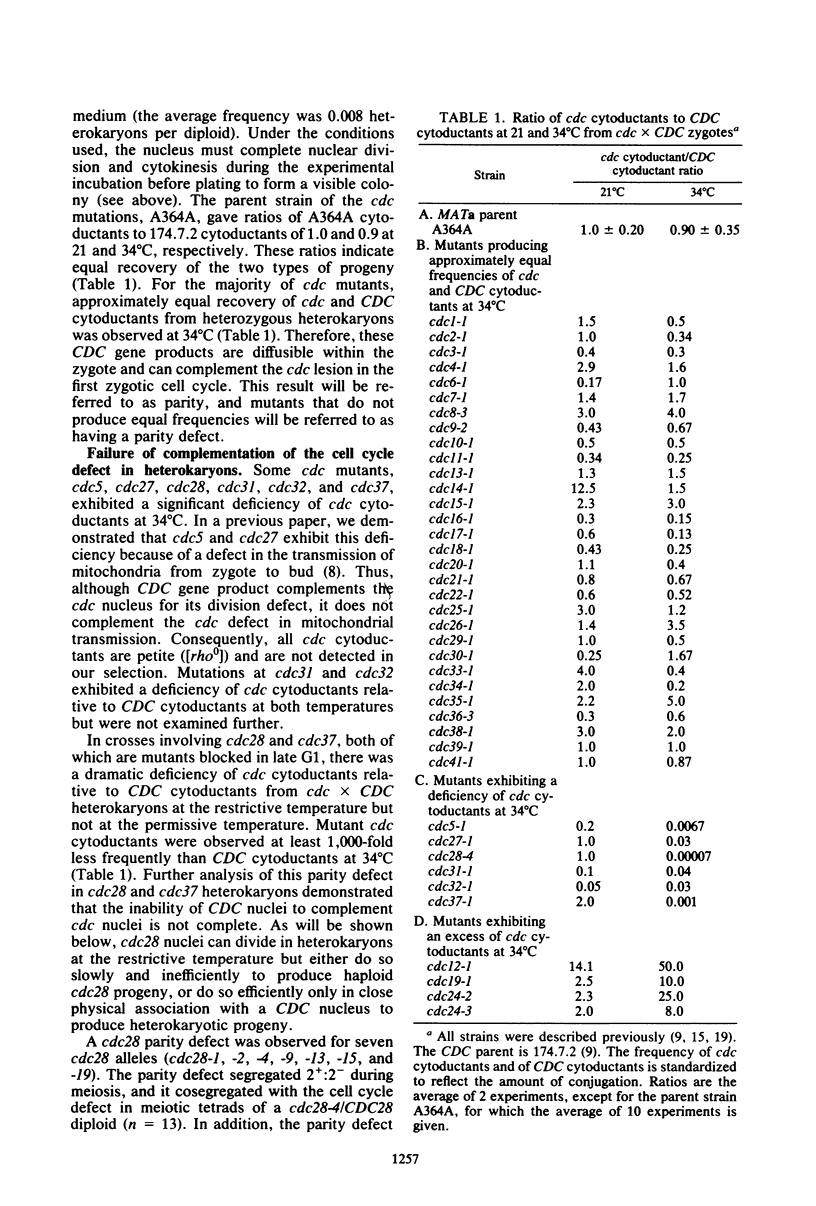Abstract
The ability of a functional gene to complement a nonfunctional gene may depend upon the intracellular relationship of the two genes. If so, the function of the gene product in question must be limited in time or in space. CDC (cell division cycle) gene products of Saccharomyces cerevisiae control discrete steps in cell division; therefore, they constitute reasonable candidates for genes that function with temporal or spatial restrictions. In an attempt to reveal such restrictions, we compared the ability of a CDC gene to complement a temperature-sensitive cdc gene in diploids where the genes are located within the same nucleus to complementation in heterokaryons where the genes are located in different nuclei. In CDC X cdc matings, complementation was monitored in rare heterokaryons by assaying the production of cdc haploid progeny (cytoductants) at the restrictive temperature. The production of cdc cytoductants indicates that the cdc nucleus was able to complete cell division at the restrictive temperature and implies that the CDC gene product was provided by the other nucleus or by cytoplasm in the heterokaryon. Cytoductants from cdc28 or cdc37 crosses were not efficiently produced, suggesting that these two genes are restricted spatially or temporally in their function. We found that of the cdc mutants tested 33 were complemented; cdc cytoductants were recovered at least as frequently as CDC cytoductants. A particularly interesting example was provided by the CDC4 gene. Mutations in CDC4 were found previously to produce a defect in both cell division and karyogamy. Surprisingly, the cell division defect of cdc4 nuclei is complemented by CDC4 nuclei in a heterokaryon, whereas the karyogamy defect is not.
Full text
PDF










Selected References
These references are in PubMed. This may not be the complete list of references from this article.
- Burton E. G., Metzenberg R. L. Novel mutation causing derepression of several enzymes of sulfur metabolism in Neurospora crassa. J Bacteriol. 1972 Jan;109(1):140–151. doi: 10.1128/jb.109.1.140-151.1972. [DOI] [PMC free article] [PubMed] [Google Scholar]
- Byers B., Goetsch L. Behavior of spindles and spindle plaques in the cell cycle and conjugation of Saccharomyces cerevisiae. J Bacteriol. 1975 Oct;124(1):511–523. doi: 10.1128/jb.124.1.511-523.1975. [DOI] [PMC free article] [PubMed] [Google Scholar]
- Byers B., Goetsch L. Duplication of spindle plaques and integration of the yeast cell cycle. Cold Spring Harb Symp Quant Biol. 1974;38:123–131. doi: 10.1101/sqb.1974.038.01.016. [DOI] [PubMed] [Google Scholar]
- Bücking-Throm E., Duntze W., Hartwell L. H., Manney T. R. Reversible arrest of haploid yeast cells in the initiation of DNA synthesis by a diffusible sex factor. Exp Cell Res. 1973 Jan;76(1):99–110. doi: 10.1016/0014-4827(73)90424-2. [DOI] [PubMed] [Google Scholar]
- Conde J., Fink G. R. A mutant of Saccharomyces cerevisiae defective for nuclear fusion. Proc Natl Acad Sci U S A. 1976 Oct;73(10):3651–3655. doi: 10.1073/pnas.73.10.3651. [DOI] [PMC free article] [PubMed] [Google Scholar]
- Dutcher S. K., Hartwell L. H. Genes that act before conjugation to prepare the Saccharomyces cerevisiae nucleus for caryogamy. Cell. 1983 May;33(1):203–210. doi: 10.1016/0092-8674(83)90349-5. [DOI] [PubMed] [Google Scholar]
- Dutcher S. K., Hartwell L. H. The role of S. cerevisiae cell division cycle genes in nuclear fusion. Genetics. 1982 Feb;100(2):175–184. doi: 10.1093/genetics/100.2.175. [DOI] [PMC free article] [PubMed] [Google Scholar]
- Dutcher S. K. Internuclear transfer of genetic information in kar1-1/KAR1 heterokaryons in Saccharomyces cerevisiae. Mol Cell Biol. 1981 Mar;1(3):245–253. doi: 10.1128/mcb.1.3.245. [DOI] [PMC free article] [PubMed] [Google Scholar]
- Dutcher S. K. Two cell division cycle mutants of Saccharomyces cerevisiae are defective in transmission of mitochondria to zygotes. Genetics. 1982 Sep;102(1):9–17. doi: 10.1093/genetics/102.1.9. [DOI] [PMC free article] [PubMed] [Google Scholar]
- Hartwell L. H., Culotti J., Pringle J. R., Reid B. J. Genetic control of the cell division cycle in yeast. Science. 1974 Jan 11;183(4120):46–51. doi: 10.1126/science.183.4120.46. [DOI] [PubMed] [Google Scholar]
- Hartwell L. H. Genetic control of the cell division cycle in yeast. IV. Genes controlling bud emergence and cytokinesis. Exp Cell Res. 1971 Dec;69(2):265–276. doi: 10.1016/0014-4827(71)90223-0. [DOI] [PubMed] [Google Scholar]
- Hartwell L. H. Macromolecule synthesis in temperature-sensitive mutants of yeast. J Bacteriol. 1967 May;93(5):1662–1670. doi: 10.1128/jb.93.5.1662-1670.1967. [DOI] [PMC free article] [PubMed] [Google Scholar]
- Hartwell L. H., Mortimer R. K., Culotti J., Culotti M. Genetic Control of the Cell Division Cycle in Yeast: V. Genetic Analysis of cdc Mutants. Genetics. 1973 Jun;74(2):267–286. doi: 10.1093/genetics/74.2.267. [DOI] [PMC free article] [PubMed] [Google Scholar]
- Mortimer R. K., Hawthorne D. C. Yeast genetics. Annu Rev Microbiol. 1966;20:151–168. doi: 10.1146/annurev.mi.20.100166.001055. [DOI] [PubMed] [Google Scholar]
- ROBERTS C. F. The genetic analysis of carbohydrate utilization in Aspergillus nidulans. J Gen Microbiol. 1963 Apr;31:45–58. doi: 10.1099/00221287-31-1-45. [DOI] [PubMed] [Google Scholar]
- Reed S. I. The selection of S. cerevisiae mutants defective in the start event of cell division. Genetics. 1980 Jul;95(3):561–577. doi: 10.1093/genetics/95.3.561. [DOI] [PMC free article] [PubMed] [Google Scholar]
- Reid B. J., Hartwell L. H. Regulation of mating in the cell cycle of Saccharomyces cerevisiae. J Cell Biol. 1977 Nov;75(2 Pt 1):355–365. doi: 10.1083/jcb.75.2.355. [DOI] [PMC free article] [PubMed] [Google Scholar]
- Wilkinson L. E., Pringle J. R. Transient G1 arrest of S. cerevisiae cells of mating type alpha by a factor produced by cells of mating type a. Exp Cell Res. 1974 Nov;89(1):175–187. doi: 10.1016/0014-4827(74)90200-6. [DOI] [PubMed] [Google Scholar]


